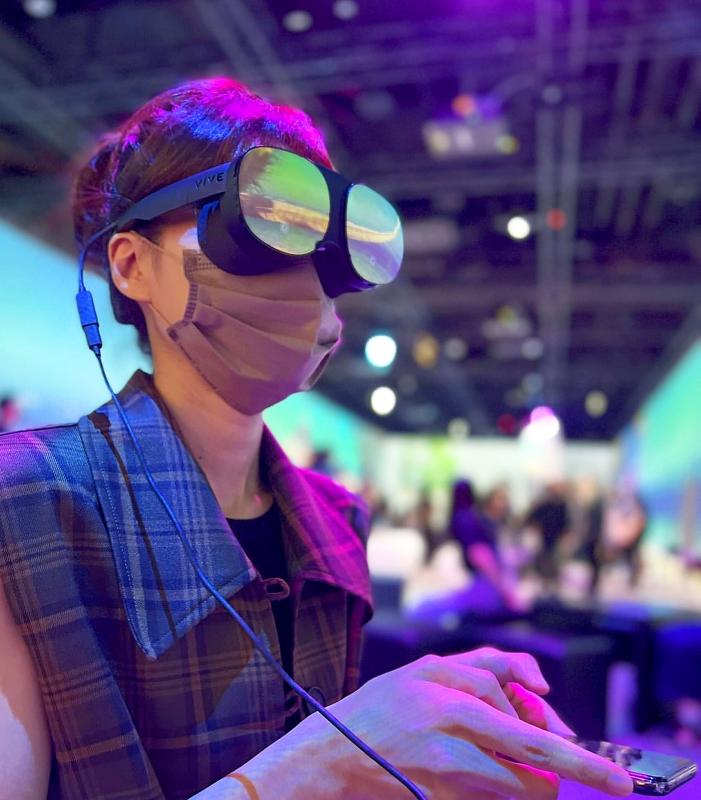Taiwanese consumer electronics company HTC Corp (宏達電) on Thursday made a leap in its development of virtual reality (VR) devices when it unveiled its latest Vive Flow immersive glasses.
The lightweight portable device allows users to watch TV programs and movies on a full-size VR cinema screen, engage in brain training exercises and interact with other people, HTC said in an online news conference.
Consumers can also use the glasses to meditate by connecting with an app, the company said in the news conference broadcast in Taiwan, New York, Los Angeles and London.

Photo: Wu Pei-hua, Taipei Times
The device creates an ideal ambience for people who wish to maintain wellness and calm their minds, HTC chief executive and chairwoman Cher Wang (王雪紅) said.
“With Vive Flow, HTC is taking technology in a new direction, focusing not on what we do, but on how we feel,” she said.
The Vive Flow has an expansive 100-degree field of vision, 3.2K resolution, a 75 Hertz refresh rate and full 3D spatial audio that can also connect to external Bluetooth earphones, HTC said.
Weighing 189g, the glasses have built-in diopter dials, which allow the user to adjustment for clear visuals, and an active cooling system that pulls warm air away from the wearer’s face, the company said.
The device is to go on sale next month with a starting price of NT$14,990 (US$534.84), it said.
Since the Taiwanese company began expanding its product line beyond smartphones in 2015, demand has been growing for its VR gadgets, especially since the COVID-19 pandemic triggered lockdowns globally.
HTC entered the VR market with its first headset, the HTC Vive, in 2016, citing a need to mitigate the impact of escalating competition in the global smartphone market.

SETBACK: Apple’s India iPhone push has been disrupted after Foxconn recalled hundreds of Chinese engineers, amid Beijing’s attempts to curb tech transfers Apple Inc assembly partner Hon Hai Precision Industry Co (鴻海精密), also known internationally as Foxconn Technology Group (富士康科技集團), has recalled about 300 Chinese engineers from a factory in India, the latest setback for the iPhone maker’s push to rapidly expand in the country. The extraction of Chinese workers from the factory of Yuzhan Technology (India) Private Ltd, a Hon Hai component unit, in southern Tamil Nadu state, is the second such move in a few months. The company has started flying in Taiwanese engineers to replace staff leaving, people familiar with the matter said, asking not to be named, as the

The prices of gasoline and diesel at domestic fuel stations are to rise NT$0.1 and NT$0.4 per liter this week respectively, after international crude oil prices rose last week, CPC Corp, Taiwan (台灣中油) and Formosa Petrochemical Corp (台塑石化) announced yesterday. Effective today, gasoline prices at CPC and Formosa stations are to rise to NT$27.3, NT$28.8 and NT$30.8 per liter for 92, 95 and 98-octane unleaded gasoline respectively, the companies said in separate statements. The price of premium diesel is to rise to NT$26.2 per liter at CPC stations and NT$26 at Formosa pumps, they said. The announcements came after international crude oil prices

DOLLAR SIGNS: The central bank rejected claims that the NT dollar had appreciated 10 percentage points more than the yen or the won against the greenback The New Taiwan dollar yesterday fell for a sixth day to its weakest level in three months, driven by equity-related outflows and reactions to an economics official’s exchange rate remarks. The NT dollar slid NT$0.197, or 0.65 percent, to close at NT$30.505 per US dollar, central bank data showed. The local currency has depreciated 1.97 percent so far this month, ranking as the weakest performer among Asian currencies. Dealers attributed the retreat to foreign investors wiring capital gains and dividends abroad after taking profit in local shares. They also pointed to reports that Washington might consider taking equity stakes in chipmakers, including Taiwan Semiconductor

A German company is putting used electric vehicle batteries to new use by stacking them into fridge-size units that homes and businesses can use to store their excess solar and wind energy. This week, the company Voltfang — which means “catching volts” — opened its first industrial site in Aachen, Germany, near the Belgian and Dutch borders. With about 100 staff, Voltfang says it is the biggest facility of its kind in Europe in the budding sector of refurbishing lithium-ion batteries. Its CEO David Oudsandji hopes it would help Europe’s biggest economy ween itself off fossil fuels and increasingly rely on climate-friendly renewables. While